虚拟语气(一)
虚拟语气一
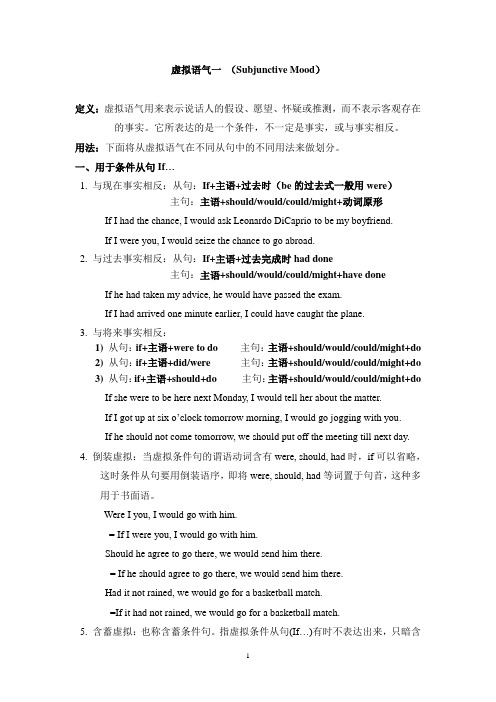
虚拟语气一(Subjunctive Mood)定义:虚拟语气用来表示说话人的假设、愿望、怀疑或推测,而不表示客观存在的事实。
它所表达的是一个条件,不一定是事实,或与事实相反。
用法:下面将从虚拟语气在不同从句中的不同用法来做划分。
一、用于条件从句If…1. 与现在事实相反:从句:If+主语+过去时(be的过去式一般用were)主句:主语+should/would/could/might+动词原形If I had the chance, I would ask Leonardo DiCaprio to be my boyfriend.If I were you, I would seize the chance to go abroad.2. 与过去事实相反:从句:If+主语+过去完成时had done主句:主语+should/would/could/might+have done If he had taken my advice, he would have passed the exam.If I had arrived one minute earlier, I could have caught the plane.3. 与将来事实相反:1) 从句:if+主语+were to do 主句:主语+should/would/could/might+do2) 从句:if+主语+did/were 主句:主语+should/would/could/might+do3) 从句:if+主语+should+do 主句:主语+should/would/could/might+doIf she were to be here next Monday, I would tell her about the matter.If I got up at six o’clock tomorrow morning, I would go jogging with you.If he should not come tomorrow, we should put off the meeting till next day. 4. 倒装虚拟:当虚拟条件句的谓语动词含有were, should, had时,if可以省略,这时条件从句要用倒装语序,即将were, should, had等词置于句首,这种多用于书面语。
【英语】初中英语专题汇编英语虚拟语气(一)及解析
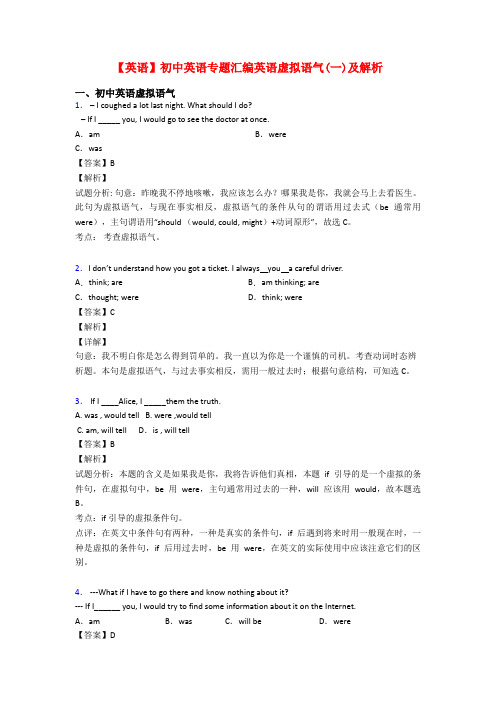
【英语】初中英语专题汇编英语虚拟语气(一)及解析一、初中英语虚拟语气1.– I coughed a lot last night. What should I do?– If I _____ you, I would go to see the doctor at once.A.am B.wereC.was【答案】B【解析】试题分析: 句意:昨晚我不停地咳嗽,我应该怎么办?哪果我是你,我就会马上去看医生。
此句为虚拟语气,与现在事实相反,虚拟语气的条件从句的谓语用过去式(be通常用were),主句谓语用“should (would, could, might)+动词原形”,故选C。
考点:考查虚拟语气。
2.I don’t understand how you got a ticket. I always you a careful driver.A.think; are B.am thinking; areC.thought; were D.think; were【答案】C【解析】【详解】句意:我不明白你是怎么得到罚单的。
我一直以为你是一个谨慎的司机。
考查动词时态辨析题。
本句是虚拟语气,与过去事实相反,需用一般过去时;根据句意结构,可知选C。
3. If I ____Alice, I _____them the truth.A. was , would tellB. were ,would tellC. am, will tell D.is , will tell【答案】B【解析】试题分析:本题的含义是如果我是你,我将告诉他们真相,本题if引导的是一个虚拟的条件句,在虚拟句中,be用were,主句通常用过去的一种,will应该用would,故本题选B。
考点:if引导的虚拟条件句。
点评:在英文中条件句有两种,一种是真实的条件句,if后遇到将来时用一般现在时,一种是虚拟的条件句,if后用过去时,be用were,在英文的实际使用中应该注意它们的区别。
英语虚拟语气总结(一)
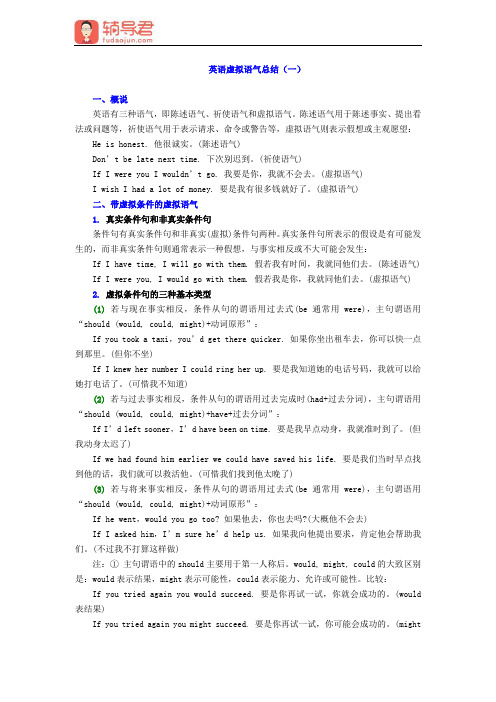
英语虚拟语气总结(一)一、概说英语有三种语气,即陈述语气、祈使语气和虚拟语气。
陈述语气用于陈述事实、提出看法或问题等,祈使语气用于表示请求、命令或警告等,虚拟语气则表示假想或主观愿望:He is honest. 他很诚实。
(陈述语气)Don’t be late next time. 下次别迟到。
(祈使语气)If I were you I wouldn’t go. 我要是你,我就不会去。
(虚拟语气)I wish I had a lot of money. 要是我有很多钱就好了。
(虚拟语气)二、带虚拟条件的虚拟语气1.真实条件句和非真实条件句条件句有真实条件句和非真实(虚拟)条件句两种。
真实条件句所表示的假设是有可能发生的,而非真实条件句则通常表示一种假想,与事实相反或不大可能会发生:If I have time, I will go with them. 假若我有时间,我就同他们去。
(陈述语气) If I were you, I would go with them. 假若我是你,我就同他们去。
(虚拟语气)2.虚拟条件句的三种基本类型(1)若与现在事实相反,条件从句的谓语用过去式(be通常用were),主句谓语用“should (would, could, might)+动词原形”:If you took a taxi,you’d get there quicker. 如果你坐出租车去,你可以快一点到那里。
(但你不坐)If I knew her number I could ring her up. 要是我知道她的电话号码,我就可以给她打电话了。
(可惜我不知道)(2)若与过去事实相反,条件从句的谓语用过去完成时(had+过去分词),主句谓语用“should (would, could, might)+have+过去分词”:If I’d left sooner,I’d have been on time. 要是我早点动身,我就准时到了。
虚拟语气专项练习(一)

虚拟语气专项练习(一)1.The boy acted ____ he had never lived in Canada before.A. as thoughB. even ifC. asD. since2.____ to the doctor right away, he might have been alive.A. If he wentB. Were he goneC. Should he have goneD. Had he gone3.If you were older, I ____ you to go there yesterday.A. will allowB. should allowC. would have allowedD. had allowed4.The secretary suggested that they ____ the men in at once.A. had broughtB. should have broughtC. broughtD. bring5.I wish I ____ able to tell him all about it last night.A. wasB. wereC. had beenD. should be6.If we ____ here ten minutes earlier, we ___ the bus.A. arrived/would catchB. arrived/would have caughtC. had arrived/had caughtD. had arrived/would have caught7.If I ____ more time, I would have gone with him.A. hadB. had hadC. have hadD. would have8.He was very busy yesterday, otherwise he ____ to the meeting.A. would comeB. cameC. would have comeD. had come9.The Jade Emperor ordered that the Monkey King _____ right away.A. would be arrestedB. must be arrestedC. be arrestedD. had to be arrested10.Jane's uncle insisted ____ in this hotel any longer.A. not stayingB. not to stayC. that he not stayD. staying not11.Don't touch the sleeping tiger. If he woke up, he _____ you.A. would come toB. would come atC. would have come towardD. will come to12.Without electricity human life _____ quite different today.A. isB. will beC. would have beenD. would be13.How I wish I ____ to reapair the watch! I only made it worse.A. had triedB. hadn't triedC. have triedD. didn't try14.He demanded that the laboratory report ___ immediately after the experiment was done.A. was writtenB. be writtenC. must be writtenD. would be written15.The man insisted that he _____ there.A. should sendB. would be sentC. sentD. be sent16.If he had not gone out in the storm _____.A.he will be alive nowB. he would be alive nowC. he would have been alive now17.If it ___ tomorrow, what would we do?A. rainsB. were to rainC. would rainD. rain18.It is required that you ____ at six.A. will arriveB. arriveC. arrivedD. would arrive19.If only I _____ how to operate an electronic computer as you do.A. had knownB. would knowC. should knowD. knew20.He spoke in a quiet, distinct voice, as though his thought _____.A. was far awayB. had been far awayC. were far awayD. went far away.21. If it ___ rain, we ___ get wet.A. is to, shouldB. were to, wouldC. were going to, wouldD. was going to, should22. If he ___ to the teacher attentively, he ___ the answer to the problem now.A. had listened, would have knownB. listened, would knowC. listened, would have knownD. had listened, would know23. But for the party, he ___ of hunger 30 years ago.A. would have diedB. would dieC. must have diedD. must die24. ___ today, he would got there for holiday.A. Was he leavingB. Were he to leaveC. Would he leaveD. If he leaves25. I would have come earlier, but I ___ that you were waiting for me.A. didn’t knowB. hadn’t knowC. would have knownD. haven’t known26. It’s high time that we ___ to school.A. would toB. wentC. goD. will go27. It seems as if it ___ rain.A. willB. is going toC. is toD. were going to28. I’d rather you ___ right away.A. leaveB. leftC. will leaveD. to leave29. He is working hard for fear that he ___.A. failsB. failedC. would failD. fail30. It is really strange that the girl ___ so early.A. has been marriedB. has marriedC. be marriedD. would marry答案:1.A 2. D 3. C 4. D 5. C 6. D 7. B 8. C 9. C 10. C 11. B 12. D 13.B 14. B 15. D 16.C 17. B 18. B 19.D 20. B 21.B 22. D 23. A 24. B 25.A 26.B 27. B 28. B 29. D 30.。
虚拟语气1

四、用在as if/ as though引导的方式状语从句中 用在 引导的方式状语从句中 She loves the orphan as if he were her own son. He talked as if he had known everything. 五、It is (high/ about) time that…(用过去时) that…(用过去时 用过去时) It is high time we began to work. It is high time that we should begin to work. It is time that children went to school. It is time that children should go to school.
*可以把 省略,将were, had, should 可以把if省略 可以把 省略, 提前, 提前,构成倒装 Should it rain tomorrow, we would stay at home. Were it to rain tomorrow, we…. Had I not taken your advice, I would have made a bad mistake.
二、在非真实条件句中(所提出的假设 在非真实条件句中( 实现的可能性极小或与事实相反) 实现的可能性极小或与事实相反) (1)与现在事实相反 (1)与现在事实相反 I would go if I had time. If there were no air, people would die. (2) 与过去事实相反 If you had got there earlier, you would have caught the bus. If I had not taken your advice, I would have made a bad mistake.
英语虚拟语气(一)解题方法和技巧及练习题及解析

英语虚拟语气(一)解题方法和技巧及练习题及解析一、初中英语虚拟语气1.If I _____you. I would wear jeans to the party.A.am B.was C.were D.are【答案】C【解析】试题分析:句意:如果我是你,我就穿牛仔裤去宴会。
与现在事实相反的虚拟语气中,系动词一律用were。
故选C。
考点:考查虚拟语气。
2.--- If I_______ one million dollars, I would give it to medical research.---If I _______ you, I would give it to charity.A.will have, am B.would have, was C.had, were D.have, is【答案】C【解析】考察虚拟语气。
第一空,虚拟语气,与现在相反,用过去时。
第二空,虚拟语气,与现在相反,用过去时,be动词用were。
故选C3.--What would you do if you ____ a million dollars?--I’d give it to the charityA.win B.won C.will win D.is to win【答案】B【解析】试题分析:句意:如果你赢了一百万美元,你要做什么?——我会把它捐给慈善机构。
结合语境可知条件从句中描述的是与将来相反的事实,故用一般过去时态,选B。
考点:if引导的条件状语从句点评:虚拟语气是一种特殊的动词形式,用来表示说话人所说的话并不是事实,而是一种假设、愿望、怀疑或推测。
判断是真实条件句还是非真实条件句。
只有在非真实条件句中才使用虚拟语气。
通过句子意思,看假设的条件是否能够实现,能够实现是真实条件句,不能使用虚拟语气;假设的条件不能实现则是非真实条件句,要用虚拟语气.判断这个假设是与哪个事实相反。
1、与现在事实相反若与现在事实相反,条件从句的谓语用过去式(be通常用were),主句谓语用“should (would, could, might)+动词原形”2、与过去事实相反若与过去事实相反,条件从句的谓语用过去完成时(had+过去分词),主句谓语用“should (would, could, might)+have+过去分词”3、与将来事实相反若与将来事实相反,条件从句的谓语用过去式(be通常用were),主句谓语用“should (would, could, might)+动词原形”:4.–I argued with my best friend. What should I do?--If I ________ you, I would say sorry to her.A.am B.was C.are D.were【答案】D【解析】试题分析:句意:我和我最好的朋友吵架了。
【英语】英语虚拟语气(一)解题方法和技巧及练习题含解析
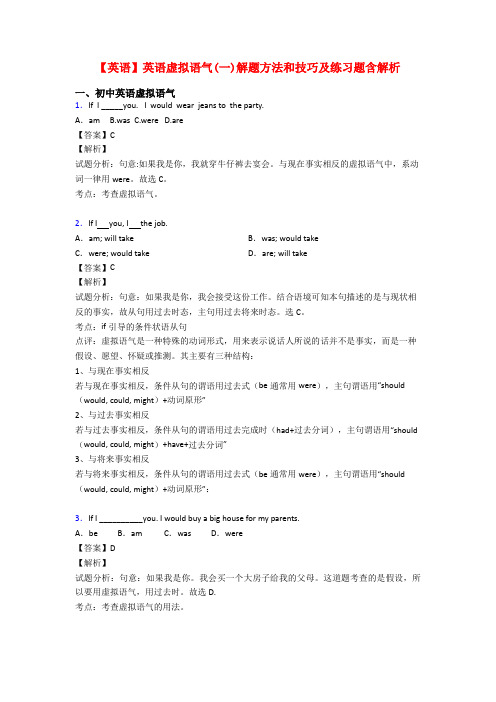
【英语】英语虚拟语气(一)解题方法和技巧及练习题含解析一、初中英语虚拟语气1.If I _____you. I would wear jeans to the party.A.am B.was C.were D.are【答案】C【解析】试题分析:句意:如果我是你,我就穿牛仔裤去宴会。
与现在事实相反的虚拟语气中,系动词一律用were。
故选C。
考点:考查虚拟语气。
2.If I you, I the job.A.am; will take B.was; would takeC.were; would take D.are; will take【答案】C【解析】试题分析:句意:如果我是你,我会接受这份工作。
结合语境可知本句描述的是与现状相反的事实,故从句用过去时态,主句用过去将来时态。
选C。
考点:if引导的条件状语从句点评:虚拟语气是一种特殊的动词形式,用来表示说话人所说的话并不是事实,而是一种假设、愿望、怀疑或推测。
其主要有三种结构:1、与现在事实相反若与现在事实相反,条件从句的谓语用过去式(be通常用were),主句谓语用“s hould (would, could, might)+动词原形”2、与过去事实相反若与过去事实相反,条件从句的谓语用过去完成时(had+过去分词),主句谓语用“should (would, could, might)+have+过去分词”3、与将来事实相反若与将来事实相反,条件从句的谓语用过去式(be通常用were),主句谓语用“should (would, could, might)+动词原形”:3.If I __________you. I would buy a big house for my parents.A.be B.am C.was D.were【答案】D【解析】试题分析:句意:如果我是你。
我会买一个大房子给我的父母。
这道题考查的是假设,所以要用虚拟语气,用过去时。
考研英语语法虚拟语气解析(一)
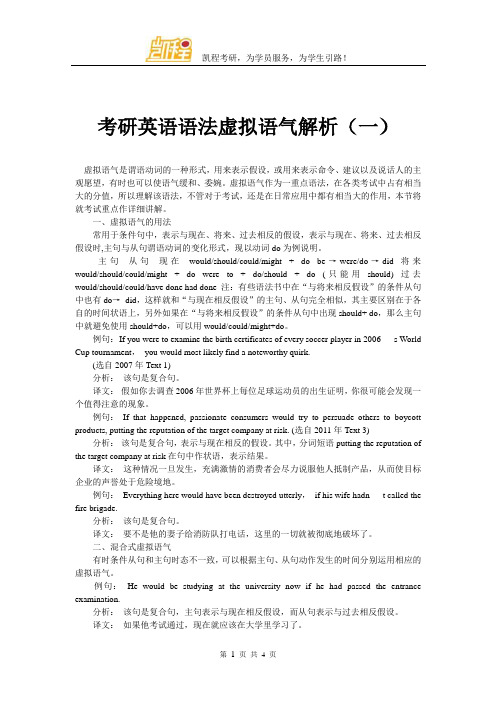
考研英语语法虚拟语气解析(一)虚拟语气是谓语动词的一种形式,用来表示假设,或用来表示命令、建议以及说话人的主观愿望,有时也可以使语气缓和、委婉。
虚拟语气作为一重点语法,在各类考试中占有相当大的分值,所以理解该语法,不管对于考试,还是在日常应用中都有相当大的作用,本节将就考试重点作详细讲解。
一、虚拟语气的用法常用于条件句中,表示与现在、将来、过去相反的假设,表示与现在、将来、过去相反假设时,主句与从句谓语动词的变化形式,现以动词do为例说明。
主句从句现在would/should/could/might + do be→were/do→did 将来would/should/could/might + do were to + do/should + do (只能用should) 过去would/should/could/have done had done 注:有些语法书中在“与将来相反假设”的条件从句中也有do→did,这样就和“与现在相反假设”的主句、从句完全相似,其主要区别在于各自的时间状语上,另外如果在“与将来相反假设”的条件从句中出现should+ do,那么主句中就避免使用should+do,可以用would/could/might+do。
例句:If you were to examine the birth certificates of every soccer player in 2006s World Cup tournament,you would most likely find a noteworthy quirk.(选自2007年Text 1)分析:该句是复合句。
译文:假如你去调查2006年世界杯上每位足球运动员的出生证明,你很可能会发现一个值得注意的现象。
例句:If that happened, passionate consumers would try to persuade others to boycott products, putting the reputation of the target company at risk. (选自2011年Text 3) 分析:该句是复合句,表示与现在相反的假设。
(英语)初中英语专题汇编虚拟语气(一)含解析
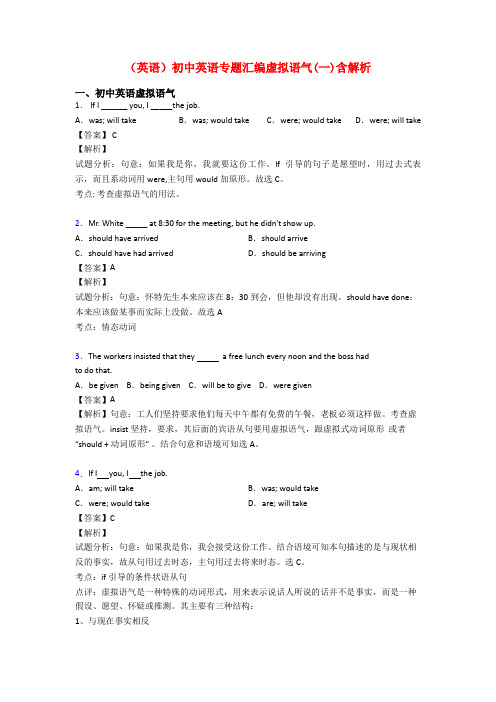
(英语)初中英语专题汇编虚拟语气(一)含解析一、初中英语虚拟语气1. If I ______ you, I _____the job.A.was; will take B.was; would take C.were; would take D.were; will take 【答案】 C【解析】试题分析:句意:如果我是你,我就要这份工作。
If引导的句子是愿望时,用过去式表示,而且系动词用were,主句用would加原形。
故选C。
考点: 考查虚拟语气的用法。
2.Mr. White _____ at 8:30 for the meeting, but he didn't show up.A.should have arrived B.should arriveC.should have had arrived D.should be arriving【答案】A【解析】试题分析:句意:怀特先生本来应该在8:30到会,但他却没有出现。
should have done:本来应该做某事而实际上没做。
故选A考点:情态动词3.The workers insisted that they a free lunch every noon and the boss hadto do that.A.be given B.being given C.will be to give D.were given【答案】A【解析】句意:工人们坚持要求他们每天中午都有免费的午餐,老板必须这样做。
考查虚拟语气。
insist坚持,要求,其后面的宾语从句要用虚拟语气,跟虚拟式动词原形或者“should + 动词原形” 。
结合句意和语境可知选A。
4.If I you, I the job.A.am; will take B.was; would takeC.were; would take D.are; will take【答案】C【解析】试题分析:句意:如果我是你,我会接受这份工作。
中考英语专题汇编英语虚拟语气(一)含解析
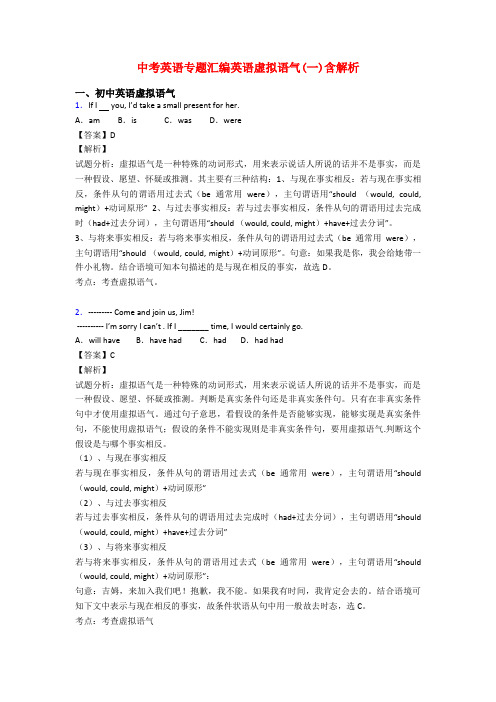
中考英语专题汇编英语虚拟语气(一)含解析一、初中英语虚拟语气1.If I you, I’d take a small present for her.A.am B.is C.was D.were【答案】D【解析】试题分析:虚拟语气是一种特殊的动词形式,用来表示说话人所说的话并不是事实,而是一种假设、愿望、怀疑或推测。
其主要有三种结构:1、与现在事实相反:若与现在事实相反,条件从句的谓语用过去式(be通常用were),主句谓语用“should (would, could, might)+动词原形” 2、与过去事实相反:若与过去事实相反,条件从句的谓语用过去完成时(had+过去分词),主句谓语用“should (would, could, might)+have+过去分词”。
3、与将来事实相反:若与将来事实相反,条件从句的谓语用过去式(be通常用were),主句谓语用“should (would, could, might)+动词原形”。
句意:如果我是你,我会给她带一件小礼物。
结合语境可知本句描述的是与现在相反的事实,故选D。
考点:考查虚拟语气。
2.--------- Come and join us, Jim!---------- I’m sorry I can’t . If I _______ time, I would certainly go.A.will have B.have had C.had D.had had【答案】C【解析】试题分析:虚拟语气是一种特殊的动词形式,用来表示说话人所说的话并不是事实,而是一种假设、愿望、怀疑或推测。
判断是真实条件句还是非真实条件句。
只有在非真实条件句中才使用虚拟语气。
通过句子意思,看假设的条件是否能够实现,能够实现是真实条件句,不能使用虚拟语气;假设的条件不能实现则是非真实条件句,要用虚拟语气.判断这个假设是与哪个事实相反。
(1)、与现在事实相反若与现在事实相反,条件从句的谓语用过去式(be通常用were),主句谓语用“should (would, could, might)+动词原形”(2)、与过去事实相反若与过去事实相反,条件从句的谓语用过去完成时(had+过去分词),主句谓语用“should (would, could, might)+have+过去分词”(3)、与将来事实相反若与将来事实相反,条件从句的谓语用过去式(be通常用were),主句谓语用“should (would, could, might)+动词原形”:句意:吉姆,来加入我们吧!抱歉,我不能。
(英语)初中英语专题汇编虚拟语气(一)含解析
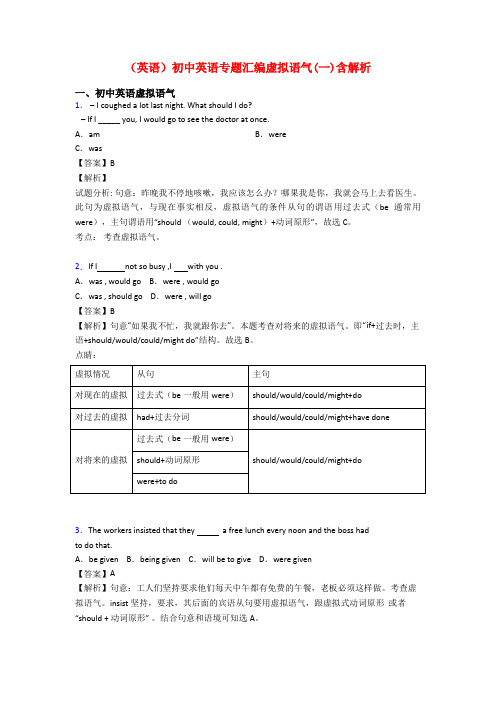
(英语)初中英语专题汇编虚拟语气(一)含解析一、初中英语虚拟语气1.– I coughed a lot last night. What should I do?– If I _____ you, I would go to see the doctor at once.A.am B.wereC.was【答案】B【解析】试题分析: 句意:昨晚我不停地咳嗽,我应该怎么办?哪果我是你,我就会马上去看医生。
此句为虚拟语气,与现在事实相反,虚拟语气的条件从句的谓语用过去式(be通常用were),主句谓语用“should (would, could, might)+动词原形”,故选C。
考点:考查虚拟语气。
2.If I not so busy ,I with you .A.was , would go B.were , would goC.was , should go D.were , will go【答案】B【解析】句意“如果我不忙,我就跟你去”。
本题考查对将来的虚拟语气。
即“if+过去时,主语+s hould/would/could/might do”结构。
故选B。
点睛:3.The workers insisted that they a free lunch every noon and the boss hadto do that.A.be given B.being given C.will be to give D.were given【答案】A【解析】句意:工人们坚持要求他们每天中午都有免费的午餐,老板必须这样做。
考查虚拟语气。
insist坚持,要求,其后面的宾语从句要用虚拟语气,跟虚拟式动词原形或者“should + 动词原形” 。
结合句意和语境可知选A。
4.--- If I_______ one million dollars, I would give it to medical research.---If I _______ you, I would give it to charity.A.will have, am B.would have, was C.had, were D.have, is【答案】C【解析】考察虚拟语气。
英语虚拟语气(一)解题方法和技巧及练习题及解析
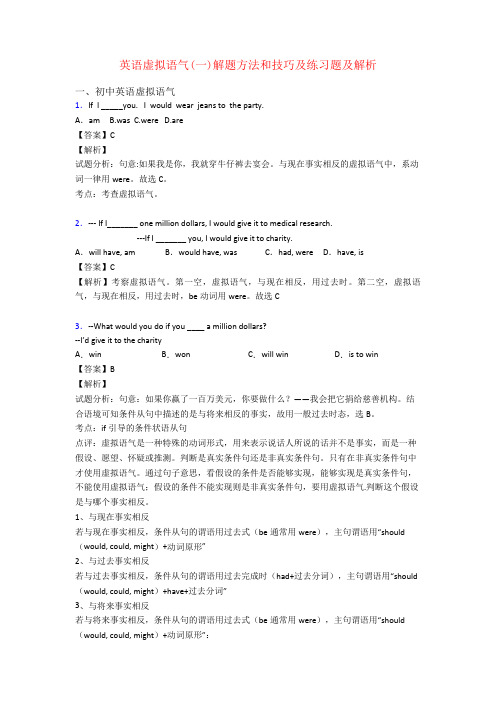
一般过去时,主句中用 would+动词的原形。故选 D。
考点:考查虚拟语气。
30.I’ m so busy. If I time, I travel around. A.have; would B.have; could C.had; would D.had; will 【答案】C 【解析】 试题分析:虚拟语气是一种特殊的动词形式,用来表示说话人所说的话并不是事实,而是
25.If I you, I’d keep quiet and listen carefully in class.
A.am
B.will be
C.were
【答案】C
【解析】
试题分析: 与现在事实相反:条件从句用动词过去式,主句用 would/could/should/might+
动 词 原 形 ; 与 过 去 事 实 相 反 : 条 件 从 句 用 had done , 主 句 用
考点:考查虚拟语气。
28.If I a boss, I would manage a big factory. A.are B.was C.were D.be 【答案】C 【解析】 试题分析:句意:如果我是老板,我会经营一家大型工厂。由句意可知,此句是虚拟语 气,if 引导的从句应该用过去式的形式,其中第一人称用 were,故答案为 C。 考点:考查虚拟语气。
假设、愿望、怀疑或推测。判断是真实条件句还是非真实条件句。只有在非真实条件句中
才使用虚拟语气。通过句子意思,看假设的条件是否能够实现,能够实现是真实条件句,
不能使用虚拟语气;假设的条件不能实现则是非真实条件句,要用虚拟语气.判断这个假设
是与哪个事实相反。
1、与现在事实相反
若与现在事实相反,条件从句的谓语用过去式(be 通常用 were),主句谓语用“should
英语虚拟语气完整归纳(1)
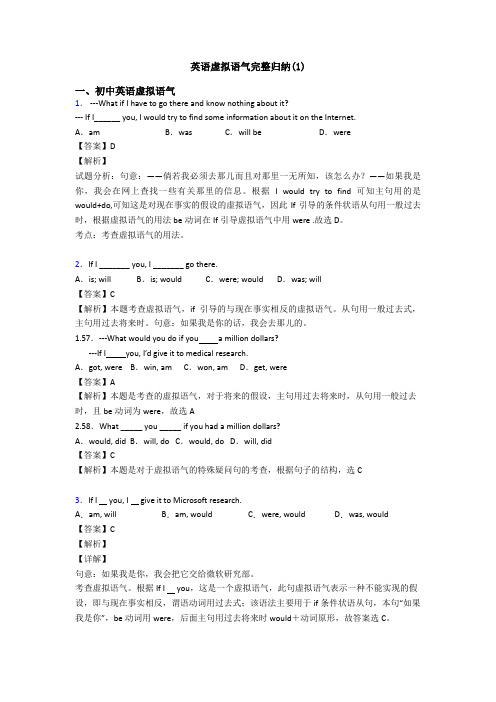
英语虚拟语气完整归纳(1)一、初中英语虚拟语气1. ---What if I have to go there and know nothing about it?--- If I______ you, I would try to find some information about it on the Internet.A.am B.was C.will be D.were【答案】D【解析】试题分析:句意:——倘若我必须去那儿而且对那里一无所知,该怎么办?——如果我是你,我会在网上查找一些有关那里的信息。
根据I would try to find可知主句用的是would+do,可知这是对现在事实的假设的虚拟语气,因此If引导的条件状语从句用一般过去时,根据虚拟语气的用法be动词在If引导虚拟语气中用were .故选 D。
考点:考查虚拟语气的用法。
2.If I _______ you, I _______ go there.A.is; will B.is; would C.were; would D.was; will【答案】C【解析】本题考查虚拟语气,if引导的与现在事实相反的虚拟语气。
从句用一般过去式,主句用过去将来时。
句意:如果我是你的话,我会去那儿的。
1.57.---What would you do if you a million dollars?---If I you, I’d give it to medical research.A.got, were B.win, am C.won, am D.get, were【答案】A【解析】本题是考查的虚拟语气,对于将来的假设,主句用过去将来时,从句用一般过去时,且be动词为were,故选A2.58.What _____ you _____ if you had a million dollars?A.would, did B.will, do C.would, do D.will, did【答案】C【解析】本题是对于虚拟语气的特殊疑问句的考查,根据句子的结构,选C3.If I you, I give it to Microsoft research.A.am, will B.am, would C.were, would D.was, would【答案】C【解析】【详解】句意:如果我是你,我会把它交给微软研究部。
英语虚拟语气真题(1)

点评:在英文中条件句有两种,一种是真实的条件句,if后遇到将来时用一般现在时,一种是虚拟的条件句,if后用过去时,be用were,在英文的实际使用中应该注意它们的区别。
14.--- If I_______ one million dollars, I would give it to medical research.
考点:考查虚拟语气的用法。
3.If Iyou,Ibuy a bike for him.
A.was,would B.was,could C.were,would D.were,could
【答案】C
【解析】
试题分析:句意:如果我是你,我会给他买一辆自行车。buy sth for sb给某人买某物;本句用的是虚拟语气,表示与现在的事实相反,在虚拟语气中不能用was,而用were,因此选C。
---If I _______ you, I would give it to charity.
A.will have, amB.would have, wasC.had, wereD.have, is
【答案】C
【解析】考察虚拟语气。第一空,虚拟语气,与现在相反,用过去时。第二空,虚拟语气,与现在相反,用过去时,be动词用were。故选C
16.Mr. White _____ at 8:30 for the meeting, but he didn't show up.
A.should have arrivedB.should arrive
C.should have had arrivedD.should be arriving
【答案】A
句意:---你能告诉我穿什么参加聚会吗?---如果我是你,我会穿蓝色的牛仔裤。本题考查的是虚拟条件句中主句和从句的时态问题。用if引导的虚拟条件句,虚拟现在时表示与现在事实相反的假设,其if从句的谓语形式用动词的过去式(be一般用were),主句用would/ should/ could/ might +动词原形,例如:If I were in your position I would marry her.结合语境可知应选C。
最新中考英语专题汇编虚拟语气(一)
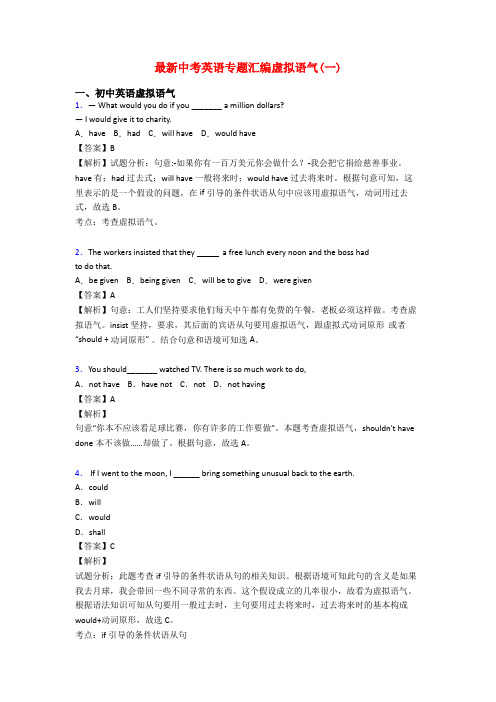
最新中考英语专题汇编虚拟语气(一)一、初中英语虚拟语气1.— What would you do if you _______ a million dollars?— I would give it to charity.A.have B.had C.will have D.would have【答案】B【解析】试题分析:句意:-如果你有一百万美元你会做什么?-我会把它捐给慈善事业。
have 有;had 过去式;will have 一般将来时;would have 过去将来时。
根据句意可知,这里表示的是一个假设的问题,在if引导的条件状语从句中应该用虚拟语气,动词用过去式,故选B。
考点:考查虚拟语气。
2.The workers insisted that they a free lunch every noon and the boss hadto do that.A.be given B.being given C.will be to give D.were given【答案】A【解析】句意:工人们坚持要求他们每天中午都有免费的午餐,老板必须这样做。
考查虚拟语气。
insist坚持,要求,其后面的宾语从句要用虚拟语气,跟虚拟式动词原形或者“should + 动词原形” 。
结合句意和语境可知选A。
3.You should_______ watched TV. There is so much work to do,A.not have B.have not C.not D.not having【答案】A【解析】句意“你本不应该看足球比赛,你有许多的工作要做”。
本题考查虚拟语气,shouldn't have done本不该做……却做了。
根据句意,故选A。
4. If I went to the moon, I ______ bring something unusual back to the earth.A.couldB.willC.wouldD.shall【答案】C【解析】试题分析:此题考查if引导的条件状语从句的相关知识。
2021新高考英语if引导的虚拟语气(一)课件ppt23张
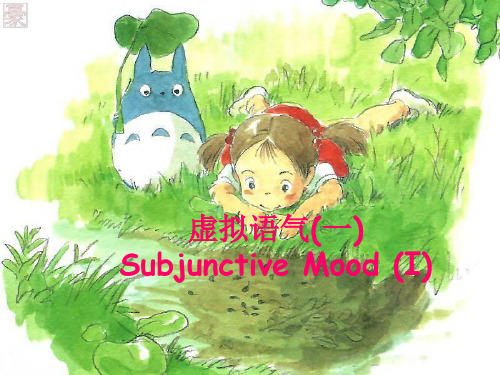
条件状语从句
did(过去式) were+ to do should+ do
精编优质课PPT广东省2021新高考英语 if引导 的虚拟 语气( 一)课件 ppt( 共23张 )(获奖 课件推 荐下载 )
精编优质课PPT广东省2021新高考英语 if引导 的虚拟 语气( 一)课件 ppt( 共23张 )(获奖 课件推 荐下载 )
a) If she had worked harder, she would have succeeded. b) The rice would not have been burnt if you had been more careful. c) If my lawyer had been here last Saturday, he would have prevented me from going.
1. If they __w__e_r_e__ (be) here, they __w_o_u__ld__ta_k_e____ (take) your advice.
2. If the world-war __b_u_r_s_t__ (burst) out again, what _w__o_u_l_d_h_a_p_p_e_n___ (happen) to our people on earth?
精编优质课PPT广东省2021新高考英语 if引导 的虚拟 语气( 一)课件 ppt( 共23张 )(获奖 课件推 荐下载 )
精编优质课PPT广东省2021新高考英语 if引导 的虚拟 语气( 一)课件 ppt( 共23张 )(获奖 课件推 荐下载 )
a) If it rained tomorrow, we would have to stay home. b) If you should succeed, everything would be all right. c) If you were to succeed, everything would be all right.
英语重点语法讲解——虚拟语气(一)

英语重点语法讲解——虚拟语气(一)今天凯撒国际英语的小编教你如何正确使用虚拟语气,虚拟语气是英语语法中的重点知识。
只有把基础英语语法学扎实了,再进一步学习可是很轻松的哦!虚拟语气表达的句子意思很丰富的,对于英语口语也有很大的帮助!接下来,一起学习吧!1)概念虚拟语气用来表示说话人的主观愿望或假想,所说的是一个条件,不一定是事实,或与事实相反。
2)在条件句中的应用条件句可分为两类,一类为真实条件句,一类为非真实条件句。
非真实条件句表示的是假设的或实际可能性不大的情况,故采用虚拟语气。
16.1 真实条件句真实条件句用于陈述语气,假设的情况可能发生,其中if 是如果的意思。
时态关系句型:条件从句主句一般现在时shall/will + 动词原形If he comes, he will bring his violin.典型例题The volleyball match will be put off if it ___.A.will rainB. rainsC. rainedD. is rained答案B。
真实条件句主句为将来时,从句用一般现在时。
注意:1)在真实条件句中,主句不能用be going to表示将来,该用shall, will.(错) If you leave now, you are never going to regret it.(对) If you leave now, you will never regret it.2)表示真理时,主句谓语动词便不用shall (will) +动词原形,而直接用一般现在时的动词形式。
16.2 非真实条件句1)时态:可以表示过去,现在和将来的情况。
它的基本特点是时态退后。
a.同现在事实相反的假设。
句型:条件从句主句一般过去时should( would) +动词原形If they were here, they would help you.b.表示于过去事实相反的假设。
英语常见虚拟语气最全总结(1)

英语常见虚拟语气最全总结(1)一、初中英语虚拟语气1.If I were invited to the party, I a red skirt.A. will wearB. wearC. would wear【答案】c【解析】试题分析:如果我被邀请参加聚会,我会穿红色的裙子。
此处考查虚拟语气。
句中,主句和从句的谓语都要用虚拟语气,与现在事实相反的假设,从句(条件句)动词过去式(be 一般用were);主句(结果句)should/would/could/might +动词原形。
故答案为C。
考点:考查虚拟语气。
2.K m so busy. If I _ time, I _travel around.A. have; wouldB. have; couldC. had; wouldD. had; will【答案】C【解析】试题分析:虚拟语气是一种特殊的动词形式,用来表示说话人所说的话并不是事实,而是一种假设、愿望、怀疑或推测。
其主要有三种结构:1、与现在事实相反若与现在事实相反,条件从句的谓语用过去式(be通常用were),主句谓语用"should (would, could, might)+ 动词原形”2、与过去事实相反若与过去事实相反,条件从句的谓语用过去完成时(had+过去分词),主句谓语用"should (would, could, might) +have+过去分词”3、与将来事实相反若与将来事实相反,条件从句的谓语用过去式(be通常用were),主句谓语用"should (would, could, might)+动词原形句意:我是那么忙。
如果我有时间我会周游世界。
与现在事实相反故选C。
考点:考查虚拟语气。
3.I'm so busy. If I time, I have a good rest.A. have, wouldB. have, couldC. had, wouldD. had, will【答案】C【解析】试题分析:句意:我太忙了,如果我有时间,我就会好好休息一下。
最新英语虚拟语气(一)解题方法和技巧及练习题

最新英语虚拟语气(一)解题方法和技巧及练习题一、初中英语虚拟语气1.If I _____ you ,I _____ them the story.A. was , tell B.were , will tell C.were ,wou ld tell D.am. would tell【答案】C【解析】试题分析:句意:如果我是你,我会告诉他们这个故事。
本题考查虚拟语气,if 从句中用一般过去时,主句中用would +动词原形,表示与现在的事实相反。
故选C。
考点:考查虚拟语气的用法。
2.If I not so busy ,I with you .A.was , would go B.were , would goC.was , should go D.were , will go【答案】B【解析】句意“如果我不忙,我就跟你去”。
本题考查对将来的虚拟语气。
即“if+过去时,主语+should/would/could/might do”结构。
故选B。
点睛:虚拟情况从句主句对现在的虚拟过去式(be一般用were)should/would/could/might+do对过去的虚拟had+过去分词should/would/could/might+have done对将来的虚拟过去式(be一般用were)should/would/could/might+do should+动词原形were+to do3.I don’t understand how you got a ticket. I always you a careful driver.A.think; are B.am thinking; areC.thought; were D.think; were【答案】C【解析】【详解】句意:我不明白你是怎么得到罚单的。
我一直以为你是一个谨慎的司机。
考查动词时态辨析题。
本句是虚拟语气,与过去事实相反,需用一般过去时;根据句意结构,可知选C。
- 1、下载文档前请自行甄别文档内容的完整性,平台不提供额外的编辑、内容补充、找答案等附加服务。
- 2、"仅部分预览"的文档,不可在线预览部分如存在完整性等问题,可反馈申请退款(可完整预览的文档不适用该条件!)。
- 3、如文档侵犯您的权益,请联系客服反馈,我们会尽快为您处理(人工客服工作时间:9:00-18:30)。
虚拟语气(一)
语气是动词的一种特殊形式,它用来表示说话者对说话内容的看法的态度。
在英语中,语气可以通过限定动词表示。
英语的语气可以分为三种:
1. 陈述语气:陈述事实、提出疑问或表示感叹。
e.g. She is very beautiful.
2. 祈使语气-- 提出请求、命令、劝告等。
e.g. Please hand in your exercises.
3. 虚拟语气-- 表示主观愿望、建议、假想、虚拟、委婉的请求和祝愿等.
e.g. I wish I were a bird.
大多数句子的谓语都用陈述语气。
祈使句用祈使语气。
只有某几类句子要用虚拟语气,且往往用于书面语。
虚拟语气的应用大致上有两类形式。
一、虚拟语气在条件句中的应用
英语的条件句有两类:真实条件句和非真实条件句。
如果提出的条件是可以实现的或者与现实情况相吻合的,就是真是条件句,句子中使用一般性质的陈述语气,即主、从句中谓语使用的时态与时间相一致。
如:
e.g. I) If the weather is fine tomorrow, we shall go fishing.
II) If there is no electricity (电), the computer can’t work.
如果提出的条件与现实相反或不大可能实现的,则为非真实条件句。
这个时候就需要使用虚拟语气。
如:
e.g. I) If I were you, I would consider her advice.
II) If you had listened to my suggestion, you would have succeeded.
非真实条件句中的虚拟语气在时态上的使用有其固定的规律,可以列表如下:
e.g. I) If I knew German, I would read the book in origin.
如果我懂德文,我就要看这本书的原文了。
(与现在事实相反)
II) You wouldn’t have caught cold if you had put on more clothes.
如果你多穿点衣服,你就不会着凉了。
(与过去事实相反)
III) If they were to (should) act like that again, we should criticize them severely.
如果他们要再这样做,我们就要严厉的批评他们。
(与将来事实可能相反)
【注1】在上面表格中,条件从句与结果主句的时态不是一种固定的搭配,二是假设主从句的内容针对的时间是一致的。
如果主从句的内容所表达的时间不一致的时候,如一个是
过去发生的,一个是现在发生的,那么主从句的动词形式则应根据各自所表示的时间来调整。
e.g. I) If he had received six more votes, he would be our chairman now.
如果他多得六票,他现在就是我们的主席了。
II) If we hadn’t got everything ready by now, we should be having a terrible time tomorrow.
如果现在一切都还没准备好,明天情况就糟了。
【注2】有些虚拟条件句不用if从句表现出来,而是通过介词、介词短语、动词不定式短语、抽象名词、动名词短语、形容词比较级、“名词-- 分词”组成的独立主格结构、并列句、形容词从句、副词从句或利用上下文等形式表现出来。
这类词语有without, with, under, but for (要不是,后接名词或代词), except for, Given more time, but that (要不是,后接从句), or, otherwise (否则的话), or else (否则)等。
如:
e.g. I) This change could not have taken place without much money.
如果没有很多钱的话,这种变化是不可能发生的。
II) I lost your telephone number; otherwise I would have rung you up long before.
我把你的电话号码丢了,不然我早就给你打电话了。
III) He would have helped us but that he had been short of money at that time.
要不是他当时手头拮据的话,他本来是会帮助我们的。
IV) We could have done better under more favorable conditions.
在更有利的条件下,我们是能够做得更好些的。
【注3】在书面语中,条件从句可以不用连词if,而将从句中的助动词should, had或were置于句首,从而构成倒装虚拟句。
如:
e.g. I) Had we made adequate preparation, we might have succeeded.
要是准备充分的话,我们是可能成功的。
II) Were it not for there assistance, we would be in serious difficulty.
要不是他们帮忙的话,我们会陷入困境。
III) Should there be a flood, what should we do?
万一发生水灾我们怎么办?。
